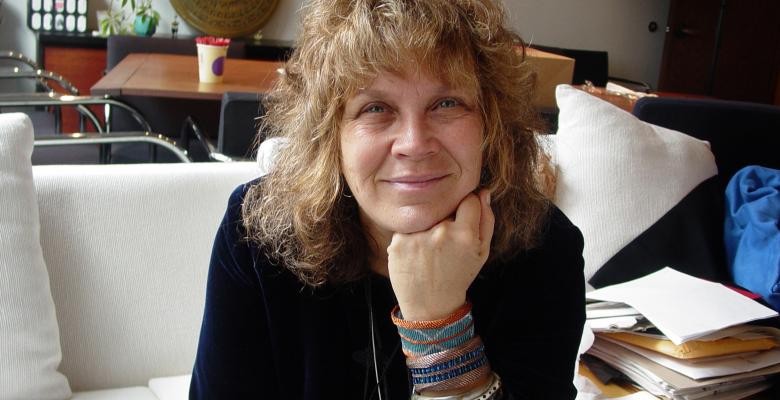“People may feel the presence of the deceased very strongly, especially right after the death. I put that level of experience into the book, which is really a long essay. I gave these encounters equal weight, even more weight perhaps, than the physical events,” said Becker, who structured the book around the four elements—fire, earth, water and air—each of which corresponds metaphorically to a different part of the end of her mother’s life. “I let these plateaus of reality converge for the reader as they have converged for me.”
Becker will discuss the book with essayist Phillip Lopate, who directs the nonfiction writing concentration at the School of the Arts, on September 20 as part of Columbia’s ongoing “Complex Issues” discussion series. Losing Helen goes on sale September 22.
Q. What prompted you to write a book about your mother’s death?
A. Losing my mother was such an enormous event for me. I needed to give the experience form. I wrote a draft soon after she died and left it at the bottom of a file drawer for two years. I thought about it a lot. I talked about it. I knew I’d come back to it, but I couldn’t immerse myself in the experience of her death again and work on it. I was afraid to let anyone read it. When I did look at it sometime later, I realized that I not only had the sketch of an essay, but I had moved beyond the raw emotion that had motivated and then immobilized the writing. At that point, I was able to rework it and give it structure. The writing let me stay close to the experience and allowed me to prolong the conversation with my mother––a conversation that continues.
Q. Most of your writing has been scholarly cultural criticism. What has it been like to write such a personal work?
A. After my mother died I began reading many texts about rituals surrounding death in other societies. I was in Laos staying at a friend’s house when an elderly neighbor died. Her Lao family built an entire structure made of paper and plywood on their porch and moved into that temporary dwelling during the mourning period, hoping to help their mother’s spirit begin its journey from her physical home to the afterlife. Such rituals intrigued me at that time, and I imagined a book that would engage these ideas. It was never a conscious decision to write so personally; it simply evolved that way. Whereas most of my previous essays were predominantly theoretical or philosophical with narrative elements interspersed, Losing Helen is predominantly narrative with occasional philosophical asides. When I realized I’d flipped the balance, I worried that this approach was so different that perhaps it would not succeed. It felt “literary” in a way that surprised me.
Q. How did your background in art, literature and philosophy inform the way you approached Losing Helen?
A. I was educated to be a literary critic––this combination of literature, philosophy, popular culture, contemporary and historical art infuses everything I do. For this book, as for all my writing, I try to get as close as I can to how I understand the events in my own mind. I then try to recreate that understanding for the reader. I understood the reality of losing my mother through those writers who have written so elegantly about the impact of loss: Simone de Beauvoir, Philip Roth, Roland Barthes and others. I didn’t think I was a writer who could achieve what they had achieved, but I understood how vulnerable they must have been. I wanted to stay as close to my own heart as they had to theirs. As I say in the beginning of the book, every death is the same, but every death also is completely unique. I wanted to capture that uniqueness, but I wanted readers to find their own experience in the book as well.
Q. Has writing Losing Helen given you more insight into the process of writing?
A. As much as I cried while writing this small book, I also experienced a lot of joy. I was outside my normal writing parameters, not sure where I was going and with no one to please but myself. This has helped me become more courageous about my own voice and about turning my psyche inside out and revealing it to the reader. I now can put myself out there in an almost anarchic way and survive that kind of exposure.
Q. How does the intersection of being a dean and a writer affect you?
A. Both tasks require psychic space, overlapping and intruding on each other, which often has a positive effect. I have written so much about art and artists as a result of my role as a dean of art schools. I would never understand what I do about process and the obstacles artists must overcome had I not been a dean. The difference between these two tasks is that I must take sole responsibility for the writing. I can control and contain the writing. If it succeeds, it is my success. The school has its own life. The collaboration between faculty, staff, students and the larger University is what makes the school great. Mostly, these two occupations work well together. If I could stretch time, there would be no conflict between them.
